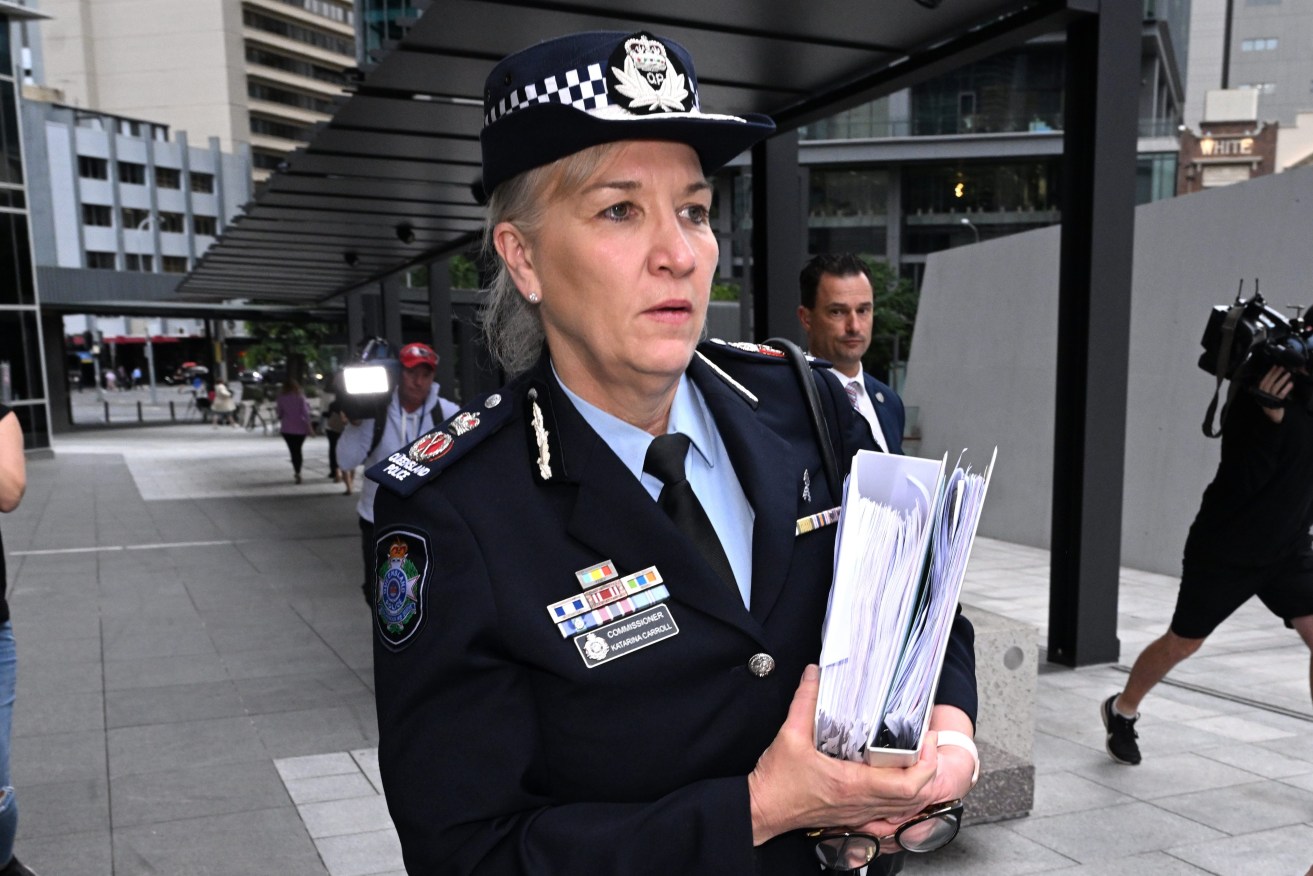Too much on her plate, or were Commissioner Carroll’s dice loaded from the start?
InQueensland’s senior reporter Paula Doneman has observed, at close quarters, the performance of Queensland’s last four Police Commissioners – and over the past few months has seen the best and worst of the 20th person – and first woman – to fill the role. Here’s how the state’s leading crime writer saw it unfold


Queensland Police Commissioner Katarina Carroll. (AAP Image/Darren England)
If I was a political cartoonist capturing recent days I would draw a picture of outgoing Queensland Police Commissioner Katarina Carroll dressed as a waiter with just about every government department piling their dirty plates on her tray.
Then as she struggles to carry the tray she falls, blindsided by an obstacle she has no way of seeing behind the pile she bears.
The same scenario will also apply to her successor as the Commissioner hangs up her badge on March 1 – four months of short of when her five-year contract finishes. Carroll’s decision to not continue followed weeks of criticism over her handling of youth crime and growing unrest in her ranks. She no longer wanted the speculation about her fate to be a distraction.
It’s been a tumultuous five years – not all of her own making – and it begs the question if she ever really had a chance to be an agent of change.
The Queensland Police Service (QPS) she inherited in 2019 already had a weakened leadership, low morale, and a recruiting scandal that to present day contributes to a thinning blue line.
She also inherited a growing youth crime problem. The QPS’s 2016-2017 Crime Drivers Report Annual Strategic Overview showed juveniles were forming a “growing a proportion of offenders”. It identified stark increases in juvenile offending in three areas of crime – robberies, unlawful entries and car theft – a 33 percent rise in one year.
In her first six months in the job Commissioner Carroll ordered an internal review that found demand for service jumped 48 per cent, clearance rates were down by 7 per cent, and there were significant numbers of abandoned calls in the previous five years as the police dealt with more complex crimes and community social issues.
The honeymoon period traditionally afforded to new leaders to settle in their new role evaporated with catastrophic natural disasters and a global pandemic.
She emerged from Covid with a fatigued police service which inverted its disaster management model to help safely navigate the state through unnerving times. Police babysat hotel rooms and conducted house checks to ensure quarantine was followed; a deputy commissioner was appointed to oversee the vaccination rollout and officers guarded Queensland borders.
The pandemic placed an unprecedented demand on an already struggling service. The road toll soared amid an absent visible police presence.
By her third year, internal disharmony confronted Commissioner Carrol and her leadership. Results of the Work for Queensland Survey pointed to discontent including criticism of the “disconnect” between police ranks and the Commissioner and her executive.
Calls for her resignation then came in 2022 following the damning findings from the public Commission of Inquiry into Queensland Police Responses to Domestic and Family Violence.
Her darkest days came in December, 2022 when four police officers were ambushed in a religious-motivated terrorist attack at a rural property at Wieambilla. Two officers and a neighbour were murdered while two other officers survived the ordeal. In June 2021, Constable Dave Masters was murdered in an alleged hit and run as he tried to stop a driver in a stolen car north of Brisbane.
Last May, after external and internal criticism, Commissioner Carroll abandoned her signature service delivery model to streamline front line jobs and reduce duplication of duties at a cost of $25.9million.
Six months later Queensland Auditor-General Brendan Worall’s report into police resourcing found the Commissioner had not identified a new model to enhance service delivery and there was no strategic direction.
The report found demand for service growing faster than officer numbers – their job made harder responding to increasingly complex crimes and social issues.
Ultimately, crises publicly manifest at the highest part of an organisation and that’s what happened to Carroll this week. However, the political rhetoric and criticism from some commentators that is up to the commissioner to “fix” youth crime is ill-informed.
The intense microscope on the Commissioner’s response to youth crime should also be turned back on the courts and government, which has had a largely offender-centric approach when it comes to juveniles. There has been little room and consideration for victims.
The government has also significantly increased the responsibilities to the QPS when it is abundantly clear they are struggling to respond to their core business of policing.
It is a government which only acts when a torch is held to its feet as a result of devastating loss of life or injury at the hands of youth offenders. There are years of quick fixes, millions of dollars and policy on the run in lieu of long-term planning.
Often the QPS are left to implement it with the funds within their existing operational budget – moving funds from one internal service to bolster the frontline.
Then there are the courts which, when dealing with youth offending, make decisions behind closed doors. Decisions which can impact an unsuspecting community.
This week senior Queensland police told a parliamentary inquiry the “tide had started to turn” with courts keeping more serious youth offenders in custody, media reported.
The police were appearing before Queensland’s Inquiry into Youth Justice Reform held by a bipartisan committee.
The inquiry heard that QPS prosecutors objected to bail between a third and half of the cases involving youth offenders before the courts. About a third of the teens subject to those objections are remanded in custody, according to media reports.
Police on the ground tell me they’re overworked having taken on diverse duties to compensate for the shortfalls of other government departments. They say there is little understanding of the complexity of their duties and legislation doesn’t support their work which is becoming increasingly dangerous.
The solution forward is not clear, particularly for youth crime, but there needs to be a root and branch change across government. It’s very hard to ask anyone to do a job unless they’ve given them the legislative tools and resources to do it.
The current/ future government and police commissioner need to rethink the strategic direction of the QPS and share the load. If the fundamentals like legislation don’t change, the next Commissioner will find themselves in exactly the same position as Katarina Carroll.












